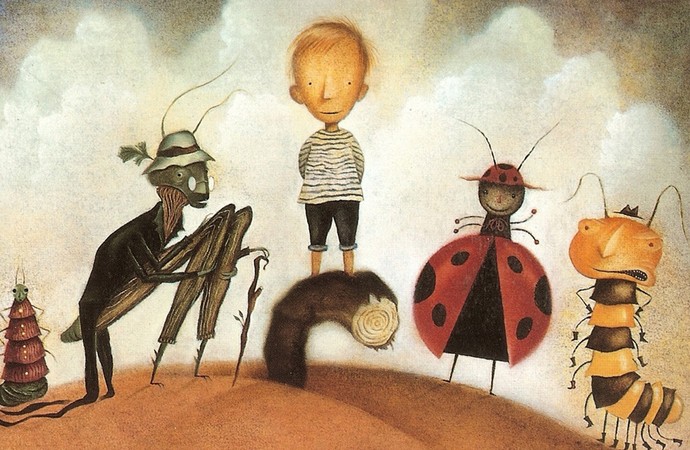“Well, maybe it started that way. As a dream, but doesn’t everything. Those buildings. These lights. This whole city. Somebody had to dream about it first. And maybe that is what I did. I dreamed about coming here, but then I did it.”
THE ADVENTURE OF FAITH
For James, in “James and the Giant Peach,” his adventures began in his dreams, as he slept on the wooden floor of his aunts’ attic. But when a stranger handed him a bag of lime-green crocodile tongues, when a single peach grew enormously on a near-lifeless tree, when a tunnel opened to a world of humanoid insects and a half-billion seagulls, he did it. He began his adventure.
The stark reality for James was that his dreams could have remained dreams, and amounted to nothing more. Similarly, the stark reality for James, brother of Jesus, is that our Christian faith may remain simply faith, and amount to nothing more. As Christians, James’ exhortation provides an objective criteria to evaluate our faith—is our faith reaching through our works and addressing the needs of the suffering?
In James’ epistle, he explains how Christ’s story should affect us. If we can come face-to-face with the beauty of the gospel, have faith in God, yet do nothing, we have merely rivaled the demons. He writes:
“You believe that God is one. You do well; the demons also believe, and shudder.”
For James, it is not enough for faith to be supported by good thoughts and well-wishing. Our faith must reach out through our works by addressing the needs of the suffering.
HOW WE SHOULD TAKE JAMES’ CRITERIA TO HEART
James writes:
“If a brother or sister is without clothing and in need of daily food, and one of you says to them, ‘Go in peace, be warmed and be filled,’ and yet you do not give them what is necessary for their body, what use is that? Even so faith, if it has no works, is dead, being by itself.”
The liveliness of our faith is tested by how well we address the needs of those suffering. When a black man is tragically killed in Sacramento, leading to a massive march, we must ask if the needs of the family or the damages of the community are being met. If everything the protesters demanded came to pass, as their demands have been met before, would this prevent future, tragic events? In the wake of the Florida school shooting, and the ensuing march on Washington, D.C., now is the time to ask the hard question of ourselves, “Are we meeting their needs?” If we pass all the demanded gun restrictions, would that change the FBI’s failure to follow-up on a January tip? Would this have changed the police’s neglect to further investigate Nikolas Cruz after being notified 39 times? Would this have changed the minds of the four sheriffs to storm the school instead of waiting outside, ordered not to go in? These are hard questions, but for James these are pressing questions for the Christian faith.
Christians must discern if their faith addresses the needs of the suffering. William F. Buckley Jr., in his classic show “Firing Line,” commented that the poor do not only suffer poverty of wealth, but also poverty of meaning. Many cities, businesses and nonprofits have responded by helping the poor to create meaning for themselves, instead of simply appealing to government stipends. Or, as time will tell, the #WalkUp movement encouraging students to reach out to the outcasts of their own school, including those in their own lunch room. Each one has resisted the temptation to appeal to the visionary or the ideal but sought out the suffering within their arm’s reach.
“James and the Giant Peach” begins with James dreaming, but his adventure does not begin until he takes the bag of crocodile tongues. James exhorts us that our faith cannot merely lead us to say or support what makes us well with our soul, but to objectively do well for those who suffer in our communities.








